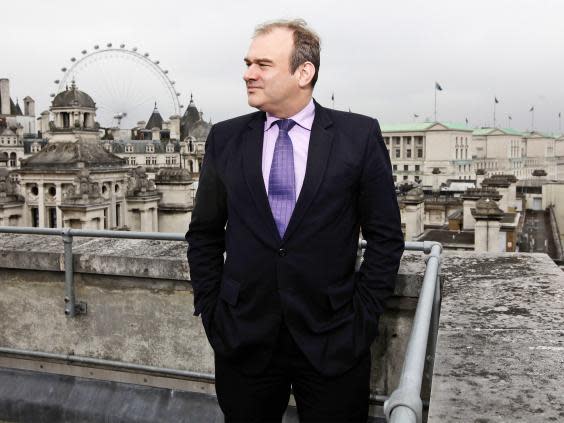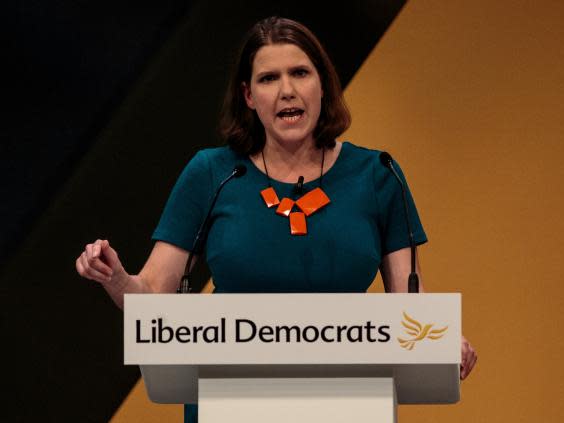Boris Johnson becoming PM could trigger Tory ministers to back fresh Brexit referendum, predict Lib Dem leadership candidates
A Boris Johnson premiership could be the trigger for Conservative ministers to break ranks and back a People’s Vote to block a no-deal Brexit, contenders for the Liberal Democrat leadership have said.
And both deputy leader Jo Swinson and home affairs spokesman Sir Ed Davey said they were hopeful of defections to the Liberal Democrats as the prospect of leaving the EU without an agreement on 31 October comes nearer.
Asked whether victory for Mr Johnson in the Tory leadership contest on 23 July would act as a “recruiting sergeant” for Lib Dems, Ms Swinson told a Westminster media hustings: “I suspect so.”
Ms Swinson said she had been having private conversations with Tory MPs “within the last week or two” about her plans to “grow the Liberal Democrat parliamentary party”.
And Sir Ed named former Tory MPs Heidi Allen and Sarah Wollaston as potential recruits in the wake of Chuka Umunna’s move to the Lib Dems.
“I’ve talked to Heidi Allen, but not Sarah Wollaston, I would be very very happy for them to join,” he said.
“Under my leadership, the party would become a political home to pro-EU liberal Tories and pro-EU liberal and social democrat Labour MPs and voters.
“If we can make them comfortable with our position, which I believe many of them already are – I’m pretty sure Heidi and Sarah are – but also show we are a successful party really going places, and they can afford to join us and hold our seats, I think we could see quite a lot of people coming our way.”

Sir Ed has floated proposals for a Government of National Unity made up of pro-EU Labour and Tory MPs as well as Lib Dems, Greens and SNP and Plaid Cymru MPs to block a no-deal Brexit and take through a Final Say referendum.
He said the prospect of an administration of this type – which would remain in power only until the referendum is completed – could be the key to persuading Tory MPs to back a vote of no-confidence in a no-deal PM, when they might otherwise hold back for fear of ushering in a general election and a Jeremy Corbyn government. He named centrist Labour MPs Yvette Cooper and Hilary Benn as potential leaders of a temporary unity government, though he stressed he had not discussed the idea with them.
Sir Ed said he had been talking with MPs on both Conservative and Labour sides about means to secure a People’s Vote, and believed the numbers were there to overturn the 292-280 defeat the last time it was brought to the Commons.
“I’m as confident as I can be there are at least six cabinet ministers who would have voted for it if they had complete freedom to vote, and many other junior ministers likewise,” he said.
“We would need some Tory members to enable a People’s Vote, but I think they are there.”
Ms Swinson agreed: “I know that there’s Conservatives, many of them actually Conservative ministers, who have been making the case within government that a People’s Vote is the best way out of this mess and have understandably been loyal to trying to get Theresa May’s deal through by collective responsibility.

“The big question is when faced with the prospect of a Boris Johnson prime minister trying to push through no-deal when they know how disastrous that is for our country, will they put the national interest ahead of the party interest? I think there are Conservative MPs who will be prepared to do that by backing a People’s Vote.”
With a series of polls showing Lib Dems, Tories, Labour and the Brexit Party running virtually neck-and-neck around the 20 per cent mark in recent weeks, both Swinson and Davey said they believed they could aim not only to hold the balance of power following the next election, but even to be the largest party and to form a government.
“The two-party system is fragmented and that creates a massive opportunity for the Liberal Democrats,” said Ms Swinson. “We are in a time in politics where the old rules don’t apply.
“I’m not wanting to hold the balance of power, I’m wanting us to be the biggest party and to aim for power. There is no limit to my ambition. I recognise the scale of the challenge, but we need to go for this as a party because the alternatives of Boris Johnson and Jeremy Corbyn are too dreadful to contemplate.”
She said she would not be willing to prop up a Corbyn government, because he was a “Brexiteer”. And she said Mr Johnson was “not fit to be prime minister” because of his previous record including inaccurate remarks about Nazanin Zaghari-Ratcliffe which have been blamed for damaging the British-Iranian mother’s hopes of release from jail in Iran.
“We have plenty of examples which show that he is absolutely not a statesman,” said Ms Swinson. “This is a man who does not deserve to lead our country.”
Sir Ed said that if Lib Dem ratings rose from their current position around 20 per cent to the high 20s or low 30s, then “all bets are off”.
With a number of former Cabinet ministers and ministers in their ranks, Lib Dems were “absolutely” ready for power, he said, adding that he personally had served in the Cabinet and the National Security Council, negotiated with the Treasury and “outsmarted” then chancellor George Osborne over funding for green schemes.
In a hung parliament, he said he would not enter coalition with a Johnson-led Conservative Party or a Corbyn-led Labour, but would “vote with the government or oppoition to pursue a Liberal Democrat policy agenda”.
He set out an agenda of abolishing austerity, backing business, directing economic support to disadvantaged Leave areas, taking action to tackle climate change and boosting education.
Sir Ed said he would back a non-party Remain candidate with cross-party backing to take on Mr Johnson in his Uxbridge and South Ruislip seat in a general election, though he apologised for using the word “decapitate” when first floating the plan earlier this week.
While he had entered the leadership race as outsider, Sir Ed insisted that “no-one knows” what the 107,000 Lib Dem members who will choose a leader on 22 July were thinking, particularly as half of them had joined since 2015 and 20 per cent since May.
“This is a historic opportunity for the Liberal Democrats and I’m the leader to seize that opportunity,” he said.

 Yahoo News
Yahoo News 
